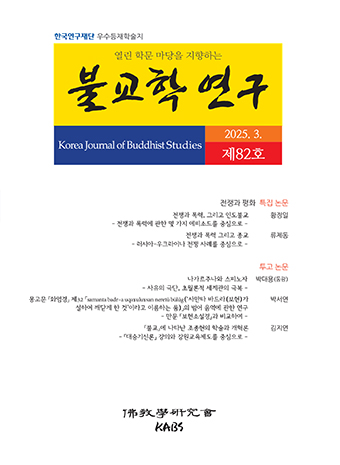- 영문명
- The Development of Buddhist Philosophy of Language: From Early Buddhism to the Mūlamadhyamakakārikā
- 발행기관
- 불교학연구회
- 저자명
- 김귀옥(Kwie-Ok KIM)
- 간행물 정보
- 『불교학연구』제84호, 113~145쪽, 전체 33쪽
- 주제분류
- 인문학 > 불교학
- 파일형태
- 발행일자
- 2025.09.30
6,760원
구매일시로부터 72시간 이내에 다운로드 가능합니다.
이 학술논문 정보는 (주)교보문고와 각 발행기관 사이에 저작물 이용 계약이 체결된 것으로, 교보문고를 통해 제공되고 있습니다.

국문 초록
본 논문은 초기불교에서 『중론』에 이르기까지 불교 언어철학의 사상 전개를 추적하고, 그 철학적 구조와 사유의 연속성을 규명하는 것을 목적으로 한다. 초기불교에서 붓다는 언어의 실체화를 경계하며, 형이상학적 질문에 대해 침묵하거나 무기(無 記)로 대응함으로써 언어의 한계와 방편적 가능성을 동시에 드러냈다. 이러한 언어관은 실재에 대한 집착을 해체하는 동시에, 언어를 올바르게 사용할 수 있는 윤리적·실천적 방향을 제시한다는 점에서 중요하다. 부파불교는 이러한 문제의식을 보다 정교하게 체계화하는 과정에서, 언어가 독립적으로 실재하는지 아니면 조건적으로 구성되는가에 대한 다양한 이론과 논쟁을 전개하였다. 중관사상, 특히 용수는 언어의 자성을 철저히 부정하고, 언어가 연기적 조건 속에서만 가설적으로 성립한다는 입장을 통해 언어 해체와 해탈을 향한 전환 가능성을 동시에 제시하였다.
이 연구는 불교의 언어관이 단순한 인식론적 논의나 언어 비판에 머무르지 않고, 수행과 해탈의 관점에서 언어를 재사유하는 전통 속에서 형성되어 왔음을 보여준다. 이러한 전개는 ‘공에 기반한 방편적 언어’와 ‘연기적 의미 생성’이라는 두 가지 핵심구조 속에서 이루어져 왔으며, 언어의 조건적 성립과 그 해체·재구성의 가능성을 동시에 드러낸다. 이는 현대 철학의 언어 논의와도 대화의 가능성을 지니며, 고대 불교의 사유가 현대의 언어철학·해석학적 논의와 만날 수 있는 기반을 제공한다. 나아가향후 연구에서는 불교 언어관이 지닌 사유의 방향과 존재 이해의 특성이 현대 철학전통 속에서 어떻게 새롭게 조명되고 확장될 수 있는지를 면밀히 규명하는 작업이 요청된다. 이를 통해 불교의 언어적 사유가 시대와 지역을 넘어, 동서 철학을 가로지르는 심층적 대화의 장으로 발전할 수 있을 것이다.
영문 초록
This study traces the development of the Buddhist philosophy of language from Early Buddhism to Nāgārjuna’s Mūlamadhyamakakārikā, aiming to clarify its philosophical structure and continuity of thought. In Early Buddhism, the Buddha warned against the reification of language and, by responding to metaphysical questions with silence or avyākṛta (undetermined answers), revealed both the limitations and the skillful use of language. This approach dismantles attachment to ultimate reality while providing an ethical and practical orientation for the proper application of language. The Abhidharma schools systematized this awareness, engaging in theoretical debates over whether language exists independently or is conditionally constructed. Madhyamaka philosophy, particularly as articulated by Nāgārjuna, rejects any intrinsic nature (svabhāva) of language and maintains that it arises only provisionally within dependent origination, thereby presenting both its deconstructive function and its transformative potential toward liberation.
The study demonstrates that the Buddhist view of language is not confined to epistemological inquiry or critique but emerges from a tradition that reconsiders language in the context of practice and liberation. This development unfolds through two central structures: “upāya-based language grounded in emptiness” and the “dependent origination of meaning.” Together, these reveal the conditional nature of language and its capacity for both deconstruction and reconstruction. These perspectives also establish a basis for dialogue with contemporary philosophy of language, linking ancient Buddhist insights with modern linguistic and hermeneutic discourse. Future research should further explore how the Buddhist philosophy of language—its orientation of thought and its understanding of existence—can be newly illuminated and expanded within modern philosophical traditions, enabling deeper dialogue that transcends temporal and cultural boundaries while bridging Eastern and Western philosophies.
목차
I. 들어가며
II. 초기불교의 언어
III. 부파불교의 언어 - 구축적 구조와 실체론
IV. 중론에서의 언어 – 반구축적 언어
V. 나가며
참고 문헌 REFERENCES
키워드
해당간행물 수록 논문
- 선사상에 나타난 초목불성의 전개와 함의
- 불교 언어철학의 전개 - 초기불교에서 『중론』까지
- 『유가론기(瑜伽論記)』에 나타난 현장(玄奘)의 학문적 위상
- 고려 사경(寫經), 젠더로 읽다 - 『묘법연화경』사경으로 본 여성의 성불과 좌절
- 초기 유가사 수행의 현대적 해석을 통한 트라우마 치유 가능성 모색 - 『수행도지경』을 중심으로
- 인성교육 주체 간 신뢰회복의 중요성 - 『대승기신론』의 수행체계를 중심으로
- 불성의 형이상학
- 『능가경』은 여래장과 알라야식을 동일시했는가?
- 물리적 대상만이 공간을 점유하는가? - 유가행 유식학파 철학에서 공간성의 문제 재검토
- 『대승기신론』의 물과 바람과 파도의 비유 연구
- “무대 위의 꼭두각시를 보라” - 임제의 삼구·삼현·삼요와 동산의 삼로를 중심으로
- 원효의 상위비량을 통한 법상유식 무성론 비판 연구 - 규기의 무성유정 인명논증을 중심으로
- 역사적 붓다의 본성에 대한 재고찰 - 초기 불교 문헌을 완성된 전체로 파악하는 접근법에 입각하여
참고문헌
교보eBook 첫 방문을 환영 합니다!

신규가입 혜택 지급이 완료 되었습니다.
바로 사용 가능한 교보e캐시 1,000원 (유효기간 7일)
지금 바로 교보eBook의 다양한 콘텐츠를 이용해 보세요!



